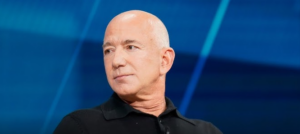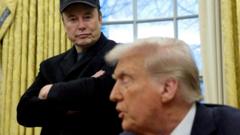Jeff Bezos’ Earth Fund has ceased its support for the Science Based Targets Initiative (SBTi), a pivotal body assessing corporate emissions reductions aligned with the Paris Climate Agreement. This decision coincides with Donald Trump's formal exit from the Paris Agreement, signaling a significant alteration in Bezos’ climate approach. Previously, the Earth Fund had heavily supported SBTi, providing a £14.5 million grant in 2021, but as that funding period concludes in 2024, SBTi is now in search of alternative donors. Reports indicate a shift towards advocating for corporate reliance on carbon credits, a move that has ignited discussions regarding its overall efficacy.
**Bezos’ Earth Fund Shifts Focus: Halts Support for Climate Initiative While Expanding Defense Contracts**

**Bezos’ Earth Fund Shifts Focus: Halts Support for Climate Initiative While Expanding Defense Contracts**
Jeff Bezos’ strategic realignment sees the Earth Fund withdraw from climate initiative funding amidst a growing presence in the defense industry.
Despite this funding withdrawal, Bezos has reiterated his commitment to climatic issues during the New York Times’ DealBook Summit, where he highlighted the critical necessity of addressing environmental challenges. His foundation is still backing initiatives such as the Greenhouse Gas Protocol and the World Resources Institute. However, as Bezos diversifies his focus, Amazon has made significant strides in the defense arena. The company has recently undertaken a £670,000 consultancy contract with the UK’s Ministry of Defence (MoD), aimed at evaluating advanced space communication systems within the scope of Amazon’s Project Kuiper satellite initiative.
This latest venture reflects a broader ambition to integrate military and private satellite networks, especially as the UK gears up for its fresh generation of communications satellites. With significant contracts on the table for the £5 billion Skynet 6 military satellite program, competition is heating up, especially against established aerospace players such as Airbus and Lockheed Martin. Concurrently, Amazon’s AWS sector is already entrenching itself within the UK’s digital and defense frameworks. Additionally, Amazon has received a license to deliver satellite broadband services in the UK, intensifying competition with Elon Musk’s Starlink.
As Bezos expands his defense investments while reducing direct climate funding, his evolving priorities are gaining attention. The long-term implications of this strategic pivot remain uncertain, yet it’s evident that his influence is expanding across both environmental and military landscapes.
This latest venture reflects a broader ambition to integrate military and private satellite networks, especially as the UK gears up for its fresh generation of communications satellites. With significant contracts on the table for the £5 billion Skynet 6 military satellite program, competition is heating up, especially against established aerospace players such as Airbus and Lockheed Martin. Concurrently, Amazon’s AWS sector is already entrenching itself within the UK’s digital and defense frameworks. Additionally, Amazon has received a license to deliver satellite broadband services in the UK, intensifying competition with Elon Musk’s Starlink.
As Bezos expands his defense investments while reducing direct climate funding, his evolving priorities are gaining attention. The long-term implications of this strategic pivot remain uncertain, yet it’s evident that his influence is expanding across both environmental and military landscapes.



















